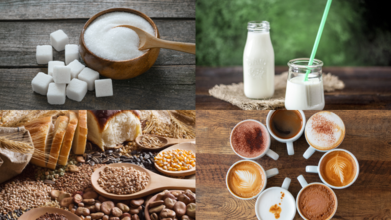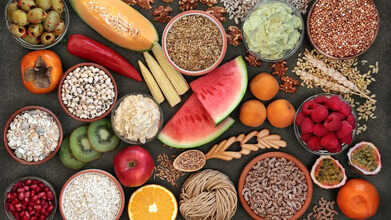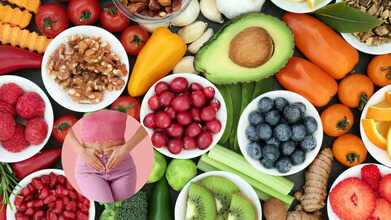- Health Conditions A-Z
- Health & Wellness
- Nutrition
- Fitness
- Health News
- Ayurveda
- Videos
- Medicine A-Z
- Parenting
- Web Stories
Sadhguru Says These 4 Foods Are Like Slow Poison For Your Body

Credits: Canva
Good health isn’t just about eating the right foods, it’s also about knowing what to avoid. Spiritual leader, Sadhguru, often emphasizes that certain foods we consume every day can silently harm our bodies over time. He calls them “enemies of health” and advises limiting or completely avoiding them.
Refined Sugar
According to Sadhguru, sugar as we consume it today is not the same as what our ancestors ate. Traditionally, sweeteners came from natural sources like jaggery or unrefined sugarcane juice. Modern white sugar, however, is highly processed and stripped of vitamins and minerals, leaving behind only “empty calories.”
Also Read: International Fetal Alcohol Syndrome Day 2025: Themes, Significance And History
Excessive sugar intake has been linked to obesity, diabetes, and heart disease. Sadhguru points out that it not only adds to weight gain but also weakens the immune system and disrupts the body’s natural balance. Choosing natural sweeteners like jaggery, honey, or fruits can be a healthier alternative.
However, Dr Palaniappan, who runs his YouTube channel under the name Dr Pal, a gastroenterologist says that jaggery or sugar do not really have that much of a difference. He explains that while 2 teaspoon of sugar have 8 grams of carbs, 2 teaspoon of jaggery have 6 grams of carbs. The difference is not that much, if your carbohydrate consumption is 200 grams per day. However, he does note that jaggery has a lower sugar spike.
Milk
While milk is often marketed as a superfood, Sadhguru suggests that most adults are unable to digest it properly. Many people lack the enzymes required to break down lactose, which can lead to bloating, mucus formation, and lethargy.
Although milk is a good source of calcium, Sadhguru recommends relying on other calcium-rich foods such as leafy greens, sesame seeds, ragi (finger millet), and nuts. Limited milk consumption is fine for those who tolerate it, but he advises against making it a daily habit for everyone.
The Physicians Committee for Responsible Medicine quotes Harvard Study that followed 72,000 women for two decades and found no evidence that drinking milk can prevent bone fractures or osteoporosis. The conclusion was milk does not necessarily build the strongest bones, though this is not to say that it has no nutrients. In fact, an estimated of 65% of the global population is lactose intolerant, majority of whom are from Asia.
Also Read: Kissing Bugs Disease Could Soon Become An Endemic, Says CDC
Refined Grains
Modern refining processes remove the outer bran and germ from grains, leaving only the starchy endosperm. This process makes the grains last longer on shelves but takes away most of the fiber, vitamins, and minerals. As a result, refined grains like white rice and maida (white flour) provide little nutrition and cause rapid spikes in blood sugar.
Sadhguru encourages the consumption of whole grains such as brown rice, millets, and whole wheat to promote better digestion, sustained energy, and improved gut health.
Tea and Coffee
Tea and coffee may be morning essentials for many, but Sadhguru cautions against their overuse. These beverages act as nervous stimulants, giving a quick burst of energy but leaving the body more tired later. Habitual consumption can lead to dependency, sleep disturbances, and heightened stress levels.
He recommends gradually reducing intake and replacing these drinks with herbal teas, fresh juices, or simply water to maintain natural energy levels throughout the day.
Is The Viral Wellness Trend ‘Fibremaxxing’ Helping Or Harming Your Gut?

Credits: CANVA
Tiktok fibremaxxing wellness trend: There is no shortage of wellness trends online that claim to transform your health, but a new one has taken over social media with a focus on gut health. It’s called “fibremaxxing,” and its premise is simple: eat more fibre to improve digestion, metabolism, immunity, and lower the risk of disease. On TikTok and Instagram, the trend often appears as colourful lentil bowls, chia puddings, and smoothies loaded with leafy greens and flaxseeds. But how much of this viral trend is actually backed by science?
The idea of increasing both soluble and insoluble fibre isn’t new, yet fibremaxxing has made it trendy again—and this time, for good reason. Fibre is vital to everyday health, supporting everything from steady blood sugar to regular bowel movements. Here’s what experts say about this growing movement and why fibre truly matters.
What Is Fibremaxxing?
Fibremaxxing is a social media movement that encourages people to boost their fibre intake by adding more fruits, vegetables, legumes, and whole grains to every meal. The goal is to improve digestion, promote fullness, and support long-term health. According to Dr. Urvi Shah, a board-certified hematologist-oncologist and physician at Memorial Sloan Kettering Cancer Center, the concept behind fibremaxxing is largely rooted in scientific evidence. Dr. Shah, who is leading multiple studies on high-fibre plant-based diets, notes that the approach aligns well with established nutrition research.
Is ‘Fibremaxxing’ Good Or Bad For Your Gut?
High-fibre diets are consistently linked to a wide range of health benefits, from lowering the risk of heart disease, diabetes, and colon cancer to aiding weight control and gut function. That’s why Dr. Shah believes fibremaxxing gets several aspects right.
She explains that including a wide variety of plant-based, high-fibre foods is essential because “different fibre types feed different microbes.” A diverse diet helps nurture a balanced microbiome. She adds that the trend’s emphasis on whole foods rather than processed or fibre-enriched items is a major plus. “Whole plants provide fibre, polyphenols, and micronutrients that work together to support the gut,” she says. Prebiotic-rich foods also help shape a healthier microbiota and increase the production of beneficial short-chain fatty acids like butyrate, which has “anti-inflammatory and anti-cancer effects.”
Simply put, upping your fibre intake through natural, unprocessed foods, rather than supplements, can make a real difference to gut health.
What’s The Daily Recommended Amount of Fibre Intake?
Experts suggest that adults should consume between 25 and 30 grams of fibre each day. Men typically require more (around 38 grams), while women need about 25 grams. These numbers can vary depending on age, sex, and calorie intake, but a general guideline is 14 grams of fibre for every 1,000 calories eaten, according to Harvard Health.
How To Add Fibre To Your Diet?
Plant-based foods are the easiest way to increase your fibre intake, this could mean starting your morning with oats or simply adding more vegetables to your meals. Dietitian Laura Tilt notes that several everyday foods are surprisingly high in fibre:
- Rolled porridge oats – 4.5g per 50g (half cup)
- Canned chickpeas – 7g per half can
- Seeded bread – 5g per two slices
- Canned lentils – 6g per half can
- Frozen peas – 4.5g per 80g (3 tbsp)
- Frozen raspberries – 5.5g per 80g (3 tbsp)
- Wholemeal pasta – 6.5g per 75g serving
- Dried apricots – 3g per 3–4 pieces
- Reduced salt/sugar baked beans – 7.5g per half can
- Mixed milled seeds (flax, pumpkin, chia) – 4.5g per 25g
Is Fibremaxxing Helpful?
There’s no doubt fibre plays an essential role in maintaining good health. But like any nutrient, too much of it can cause problems if not balanced properly. A sudden surge in fibre intake without enough water can lead to bloating, gas, constipation, dehydration, or even trigger IBS symptoms. Over-focusing on fibre might also cause you to overlook other nutrients your body needs. The key is moderation, fibre is beneficial, but it works best as part of a balanced, varied diet.
Does What Time You Eat Breakfast Reveal How Long You Will Live? Study Reveals Why Time Matters For Breakfast

(Credit-Canva)
While people do take eating healthily seriously, many people forget to take the timing into consideration. Many studies have shown that eating late at night or midnight snacking is bad for your metabolism and makes you gain weight, but does the same logic apply to how early you eat your breakfast? A new published in Communications Medicine explains why the timing may be important, even for breakfast.
The time you eat breakfast could play a surprising role in your overall health and even influence how long you live. New research suggests that for older adults, meal timing, especially when they eat their first meal, may reveal important clues about their health status. The study found that eating breakfast later in the day was linked to higher rates of health issues like depression, fatigue, and dental problems, along with a greater risk of early death.
Experts believe that changes in an older person's meal schedule, particularly breakfast time, could be an easy way to check on their general health. He suggests that encouraging older adults to stick to regular mealtimes could be an important step in promoting healthy aging and a longer life.
How Does Breakfast Timing Affect Health?
The research followed almost 3,000 adults in the U.K., aged 42 to 94, for over 20 years. The people in the study reported their usual times for breakfast, lunch, and dinner, along with details about their health.
Meal Times Shifted Later with Age
As the participants got older, both their breakfast and dinner times gradually became later. For every ten years of life, breakfast was delayed by about eight minutes and dinner by four minutes.
The Serious Connection
Most importantly, delaying breakfast was linked to having more long-term health problems and a higher chance of death during the study period. For every hour breakfast was delayed, the risk of death went up by 8–11%.
Experts emphasized that eating later, especially delaying breakfast, is tied to both health problems and a higher risk of death in older people. This finding gives new weight to the old saying that breakfast is the most important meal of the day, especially for seniors.
Why an Early Breakfast is Better for Your Health
While this study can't definitively prove that eating earlier directly causes a longer lifespan, experts agree that the evidence strongly supports a regular, early breakfast habit.
Work with Your Body's Clock
Experts recommend having breakfast within one to two hours of waking up. Experts also explained that our body's ability to process food is best right after we wake up.
Avoid Health Risks
Skipping or heavily delaying breakfast can lead to dangerous spikes in blood sugar later in the day. These spikes can hurt blood vessels, increase body inflammation, and raise the risk of serious illnesses like type 2 diabetes and heart disease.
Keep Your System in Sync
Eating early helps keep your body's internal 24-hour clock (circadian rhythm) working correctly. This proper timing supports better metabolism and better sleep patterns throughout the day.
The Importance of Routine
Health experts strongly emphasize that the consistency of your mealtimes is just as important as the time itself. Eating at regular times helps keep the body's natural 24-hour rhythm strong, which controls everything from digestion to hormones.
A healthy life includes a routine of exercise, good sleep, social connections, and healthy eating habits, which means being thoughtful about what you eat and when you eat it.
By regularly eating breakfast and dinner earlier, you match your eating pattern with your body's natural cycle. This can help you avoid eating too much late at night and supports better sleep. Having a simple, consistent breakfast may be one of those small, daily choices that add up to a longer, healthier life.
Your Menstrual Cycle Affects How You Eat—Here’s What to Eat During Each Phase

Credits: Canva
With growing awareness of how the female body changes each month, and the help of apps that make tracking easier, more women are beginning to understand how to live in sync with their cycles. According to Dr. Uma Shankar Sharma, Medical-In-Charge at Kailash Institute of Naturopathy, Ayurveda, and Yoga, what you eat during each phase of your menstrual cycle has a major impact on your hormones, energy, and mood.
What Are the Different Phases of the Menstrual Cycle?
Though biology books often describe a 28-day cycle, in reality, most women fall anywhere between 23 and 35 days. Within that span, the body passes through four phases: menstrual, follicular, ovulatory, and luteal. Each phase involves different hormonal changes and physical shifts that influence how you feel and function.
Four Phases of the Menstrual Cycle
The menstrual cycle begins with the menstrual phase, when the uterine lining is shed as bleeding. Next comes the follicular phase, when the body prepares an egg for release. During the ovulatory phase, a mature egg is released, and in the luteal phase, the uterus thickens in anticipation of pregnancy. If conception does not occur, the cycle restarts, as per Cleveland Clinic.
What to Eat During Every Phase of Your Menstrual Cycle
Food choices play a key role in maintaining hormonal balance, energy, and overall wellness. Dr. Sharma explains that Ayurveda recommends eating according to the body’s changing doshas, Vata, Pitta, and Kapha, throughout the month. Aligning your diet with these shifts can ease cramps, bloating, and fatigue, while helping restore nutrients lost during menstruation.
1. Menstrual Phase (Days 1–4)
At the start of your period, Vata dosha is heightened, and your body needs warmth and comfort. Dr Sharma suggests choosing simple, nourishing meals like steamed khichdi (made with moong dal and rice), warm porridge with ghee, and lightly cooked leafy greens. Gentle spices such as cumin, coriander, fennel, and ginger aid digestion, while ghee or sesame oil supports nutrient absorption. Avoid cold, raw, or fried foods, which can worsen pain and slow digestion. A warm cup of ginger tea can help soothe cramps and ease bloating.
2. Follicular or Postmenstrual Phase (Days 5–14)
As your energy returns, Kapha dosha rises. Focus on lighter, fresh meals that recharge your system, think fresh fruit, steamed vegetables, whole grains like millet, barley, or quinoa, and soft-cooked lentils. Dr Sharma says, “Soaked nuts and seeds provide essential minerals. Mild spices like turmeric, coriander, and ginger help keep digestion active and support nutrient absorption during this rejuvenating stage.”
3. Ovulatory Phase (Days 14–17)
During ovulation, Pitta dosha dominates, and your body functions at its most active. Cooling and hydrating foods are best during this time. Dr Sharma suggests eating fresh fruits such as watermelon and cucumber, drinking coconut water or diluted juices, and including sprouts and plant-based proteins like tofu or paneer. Avoid spicy, oily, or sour foods that can increase internal heat or irritate digestion.
4. Luteal/Pre-Menstrual Phase (Days 18–28)
As Pitta remains strong and Vata begins to rise again, your body benefits from grounding, nourishing meals that help calm premenstrual discomfort. Complex carbohydrates such as sweet potato, squash, oats, and cooked greens can support stable energy levels. Foods rich in magnesium, like bananas, seeds, nuts, and dark chocolate, can help ease cramps, bloating, and mood swings. Staying hydrated, sipping herbal teas, and including healthy fats throughout the month help maintain a steady, balanced cycle.
© 2024 Bennett, Coleman & Company Limited

